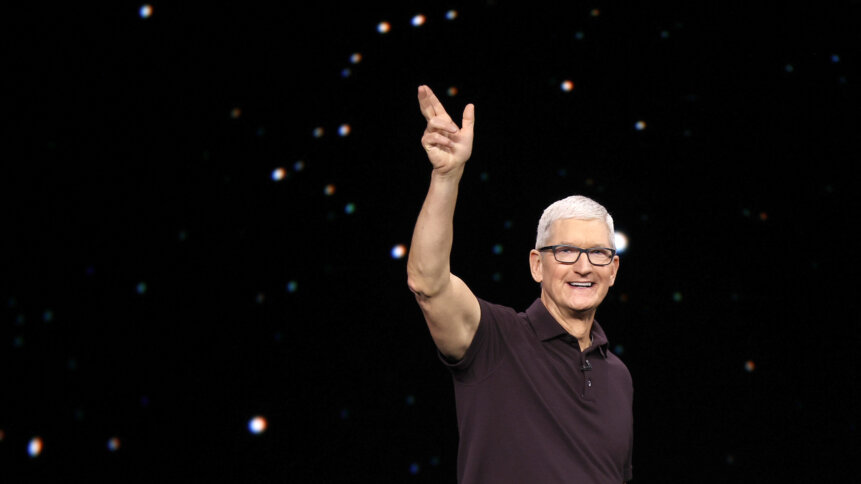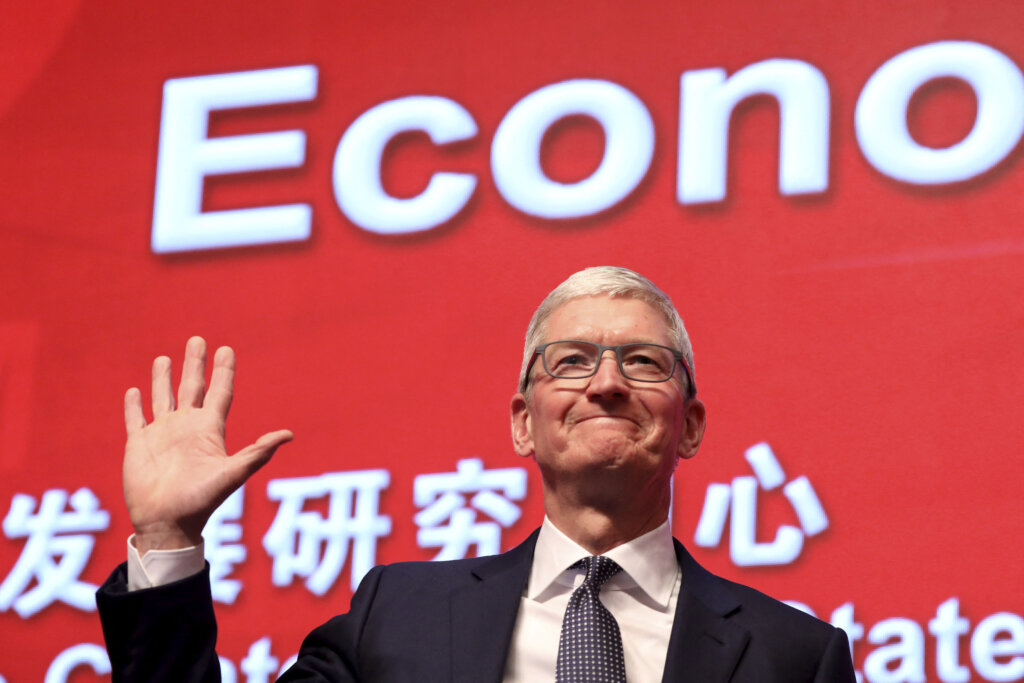Tim Cook just proved why Apple can’t and won’t quit China

It was 1993 when Apple first established its presence in China with a Beijing office. This year, the US tech giant completed its first 30 years in the Chinese market, Apple’s most important market yet. “I’m thrilled to be back in China,” Apple’s CEO Tim Cook said during a panel discussion at the China Development Forum (CDF) in Beijing last Saturday.
It was Cook’s first visit to China since the outbreak of the Covid-19 pandemic.
Cook wasn’t alone; he was accompanied by a group of top US executives attending the CDF in Beijing last weekend. Their attendance reflects US companies’ commitment to the Chinese market despite rising calls from US officials for an economy-wide decoupling from China and the restructuring of supply chains.
“I started coming to China even before I joined Apple, so my relationship with China goes back a long time,” Cook said, noting that Apple will celebrate its third decade in China this year. The US and China have been locked in a stalemate for years now – and although Apple has unfortunately been stuck in the middle, the company has kept on working in China.
The US and China’s antagonistic stances on security, economics, technology, and ideology have crystallized over recent years. Accumulation of those antagonisms has left little space for the adjustments that could relieve simmering tensions that have shown little sign of abating.
While a significant number of American companies in recent years have had a growing list of reasons to downgrade their ties with China, Apple emerged from the bruising conflict in a better position than most. While the iPhone maker has lately been working on diversifying its production to avoid solely depending on China, as Cook said during his visit, “Apple and China… grew together, and so this has been a symbiotic kind of relationship.”
How Cook made Apple prevail in the US-China trade war
Looking back, Apple, under the helm of Cook has kept its China-manufactured iPhones off the list of Chinese imports that President Trump slapped with roughly US$250 billion in tariffs, and those years set the tone for Apple, putting it in an enviable position compared with other companies caught in the crossfire.

Apple CEO Tim Cook waves as he arrives for the Economic Summit held for the China Development Forum in Beijing on March 23, 2019. (Photo by Ng Han Guan / POOL / AFP)
Apple’s position is primarily attributed to efforts of the soft-spoken, 62-year-old Cook, who actively cultivated leaders in both countries. In the US, Cook has made a point of directly engaging with both Trump and Biden individually, even as both presidents’ policies and remarks have scared off other executives from Silicon Valley.
And in China, according to a local media report, Cook — who knows some Mandarin — has actively cultivated government and business leaders during his frequent visits to a country where Apple’s supply chain supported an estimated 5 million jobs as of 2019. Under Cook’s leadership, the business of Apple in China grew from a fledgling success to an empire, with annual revenues of around US$50 billion during the pre-pandemic years.
It is safe to say that more than any other tech company, Apple has always been willing to put a brave face on and work with the US government because Apple has more at stake than any other tech company in China. Even when Cook visited Capitol Hill last December to meet privately with senior lawmakers, his company’s relationship with China was high on the agenda.
Apple, at that point, conceded the unrest in China due to its Zero Covid Policy had created “significant” supply chain disruptions, all while the company was facing political, strategic, and investor pressure at home to cut its manufacturing reliance on the Eastern powerhouse dramatically. That was when Apple’s reliance on China for its annual cadence of product refreshes stood as its most significant vulnerability.
Apple diversified but never left – and perhaps never will
The stark reality is that no other big tech company shares the level of exposure Apple has in China. To put things into context, even Korean giant Samsung, the only company that sells more phones than Apple, is much less exposed. “Samsung closed its Chinese plants in 2019, after its local market share collapsed to less than 1% from nearly 20% in 2013, as homegrown rivals Huawei, Xiaomi, and Oppo thrived,” The Financial Times wrote.
But Cook’s trip this week comes after one of Apple’s most challenging years in China. Last November, the company’s most significant downfall was the production disruptions at the world’s largest iPhone factory in Zhengzhou, Henan province, fuelled by Covid-19 outbreaks. President Xi Jinping’s zero-Covid controls savaged supply chains and delayed deliveries of iPhones during the holiday period last year.
That led Apple’s quarterly revenue in the three months to end-December to fall for the first time in three and a half years. Amid all that, Apple and its contract manufacturers have been relocating some of their production lines out of mainland China to places such as Vietnam and India.
Yet, when Cook met China’s new premier Li Qiang and other top officials this Monday, he reaffirmed the US tech giant’s commitment to the market without mentioning supply chain shifts and geopolitical uncertainties. It shows that even though Apple suppliers are looking to step up production expansion outside China, the country remains an important market for the smartphone maker.
Even China doesn’t want that to change, or at least that’s what Wang Wentao, China’s Minister of Commerce, made Cook believe. When they met earlier this week, Wang and Cook discussed “Apple’s development in China and the stabilization of the industry supply chain,” according to a statement by the ministry.
According to a South China Morning Post report, Wang also said in his meeting with Cook that the Chinese government is willing to provide a good environment and services to foreign companies, including Apple. Cook also took the the opportunity of the trip to announce that Apple will increase its funding for educational projects in China to 100 million yuan (US$14.5 million).
Cook, as expected, did not answer a question about Apple’s plans in the Chinese market amid concerns about “decoupling” and supply chain adjustment. On technology development in China, Cook said he thinks innovation is moving so fast and will only speed up, including in artificial intelligence and augmented reality.
It is safe to say that Cook’s latest visit to China signals that Apple is far from being done with the world’s biggest smartphone market. We’ll have to wait and see what unfolds in the near future.










